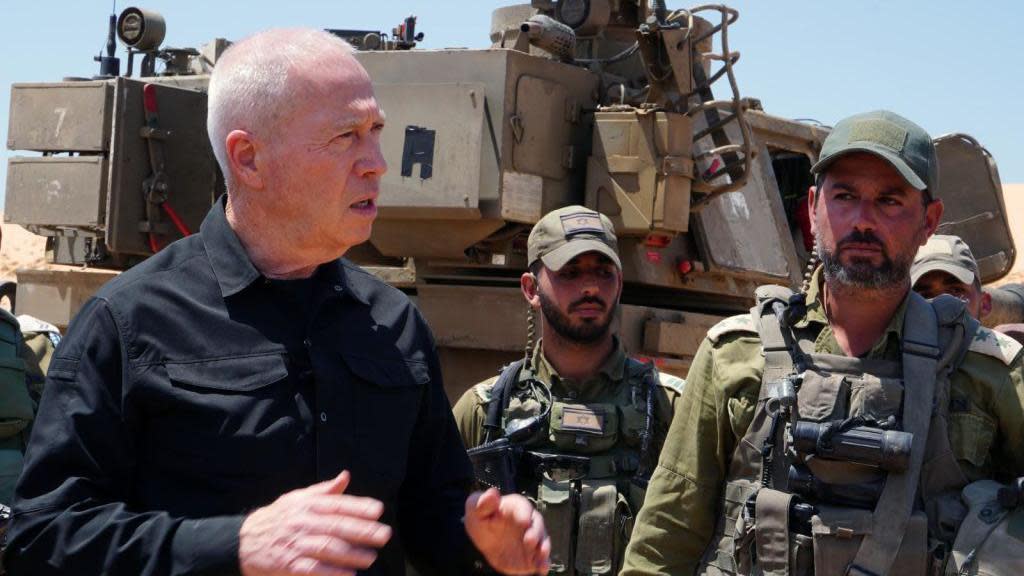Israel's defence minister rejects ICC prosecutor’s request for warrants

- Oops!Something went wrong.Please try again later.
- Oops!Something went wrong.Please try again later.
- Oops!Something went wrong.Please try again later.
Israeli Defence Minister Yoav Gallant has rejected the arrest warrants sought by the International Criminal Court's prosecutor for him and Prime Minister Benjamin Netanyahu.
Mr Gallant said the prosecutor, Karim Khan, had drawn a "despicable" parallel between Israel and the Palestinian armed group Hamas and attempted to deny his country's right to self-defence.
Mr Khan also accused Hamas’s Gaza leader Yahya Sinwar, military chief Mohammed Deif and political leader Ismail Haniyeh.
He said on Monday that he had "reasonable grounds" to believe the five men bore "criminal responsibility" for alleged war crimes and crimes against humanity during the war in Gaza.
Mr Netanyahu and Hamas also reacted with outrage to the announcement.
If the ICC’s judges decide to issue the arrest warrants, it will be up to its 124 member states - who do not include Israel or its ally, the US - to decide whether or not to enforce them.
The US said the move against Israel’s leaders was “outrageous”, while the UK described it as “deeply unhelpful”. But France expressed support for the ICC and its “fight against impunity”.
https://www.bbc.co.uk/news/articles/cx88l499vero
Mr Khan’s case against the leaders of Hamas and Israel stems from the events of 7 October, when Hamas gunmen attacked southern Israel, killing about 1,200 people and taking 252 others back to Gaza as hostages.
Israel responded to the attack by launching a military campaign to eliminate Hamas, during which at least 35,640 people have been killed in Gaza, according to the territory's Hamas-run health ministry.
Mr Khan accused the Hamas leaders of crimes against humanity and war crimes including extermination, murder, the taking of hostages, rape and torture.
For the Israeli leaders, the accusations included deliberate attacks on civilians, and the use of starvation as a weapon of war, as well as extermination and murder.
"International law and the laws of armed conflict apply to all," Mr Khan said. "No foot soldier, no commander, no civilian leader - no-one - can act with impunity.”
In a statement, Mr Gallant insisted that Israeli forces were fighting in Gaza “in accordance with international law, while taking unprecedented measures to facilitate humanitarian aid”.
“I stand with, support, and commend our troops, who are defending our people and fulfilling the extraordinary privilege and obligation of defending ourselves, by ourselves,” he said.
He added: “The attempt made by the ICC prosecutor Karim Khan to turn things around will not succeed - the parallel he has drawn between the Hamas terrorist organization and the State of Israel is despicable.”
Mr Gallant reiterated that Israel was not a signatory of the Rome Statute, the ICC’s founding treaty, and did not recognise its authority.
“Karim Khan's attempt to deny the State of Israel the right to defend herself and ensure the release of the hostages held in Gaza must be rejected explicitly.”
There was no immediate response from Mr Khan to the remarks or to the statement made by Mr Netanyahu, who denounced the warrant applications for him and Mr Gallant as a “moral outrage of historic proportions”.
Hamas - which is proscribed as a terrorist organisation by Israel, the US, UK and other countries - demanded the “cancellation of all arrest warrants issued against leaders of the Palestinian resistance” and denounced what it called Mr Khan's "attempts... to equate the victim with the executioner".
The group also complained that the application for warrants against Mr Netanyahu and Mr Gallant had come “seven months late”, and that other Israeli political and military leaders had not been named alongside them.
The Israeli government also urged on Tuesday “the nations of the civilised, free world - nations who despise terrorists and anyone who supports them - to stand by Israel”.
“Make sure the ICC understands where you stand,” spokesman Tal Heinrich told a briefing.
“Oppose the prosecutor's decision and declare that, even if warrants are issued, you do not intend to enforce them. Because this is not about our leaders. It's about our survival."
The US ambassador to Israel, Jack Lew, said there was no comparison between "actions taken by a democratic government here with the behaviour of a terrorist organisation that is fighting in a way that has created these conditions".
“I don't think that a day has gone by that I haven't worked with either the prime minister or the defence minister or somebody in their immediate circle on how you get humanitarian assistance to starving people," he told a conference, according to Reuters news agency.
Speaking to reporters in Vienna, UK Prime Minister Rishi Sunak also branded Mr Khan’s decision as a “deeply unhelpful development”.
"There is no moral equivalence between a democratic state exercising its lawful right to self-defence and the terrorist group Hamas."
Italy’s Foreign Minister, Antonio Tajani, said it was “truly singular, I would say unacceptable, to equate a government legitimately elected by the people in a democracy with a terrorist organisation”.
And Czech Prime Minister Petr Fiala described the allegations against Israeli leaders as “appalling and completely unacceptable”.
However, their reaction contrasted sharply with those of other European countries.
French foreign ministry put out a statement late on Monday voicing support for the ICC, “its independence and the fight against impunity in every situation”.
Belgium’s Foreign Minister Hadja Lahbib also said it prioritised the fight against impunity and that “crimes committed in Gaza must be prosecuted at the highest level, regardless of the perpetrators”.
The German foreign ministry said it respected the ICC’s “independence and the conduct of proceedings”, but warned that the simultaneous warrant requests had “resulted in an incorrect implication of equivalence”.
A European Union spokesman said it supported the ICC’s “central role in bringing justice to victims in all situations under its jurisdiction” and that the bloc would be “taking note of” the rulings of the court’s judges to Mr Khan’s applications.

